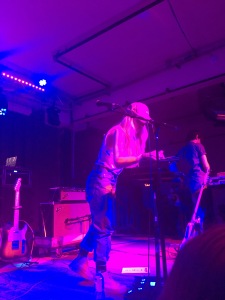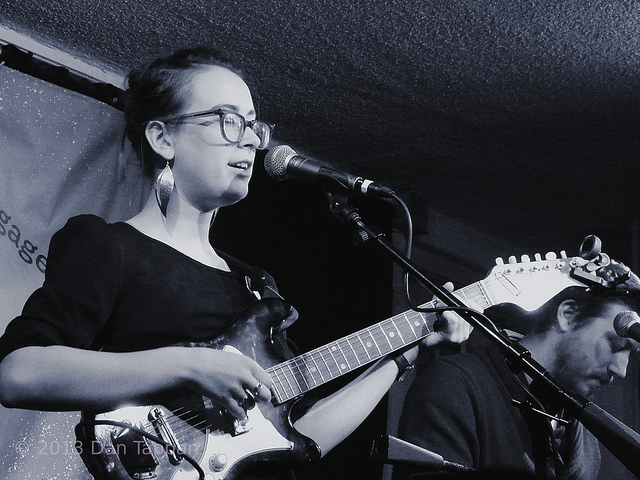 The line to see Now, Now at Sonia Night Club snaked around the street, all the way past the building’s colorful murals. Anticipation was a big theme outside the Cambridge venue– strangers buzzed to one another about the last time they’d seen the band, touting dates and venue names like trophies. Now, Now’s 5 year gap between albums left their followers waiting anxiously for a sign, and recently they’ve been in luck: the band released “SGL,” the first single from their upcoming album, and embarked on a tour at the start of the summer. The venue is packed, from the stage to the sound booth, and everyone is ready for the reemergence of their elusive indie pop favorite.
The line to see Now, Now at Sonia Night Club snaked around the street, all the way past the building’s colorful murals. Anticipation was a big theme outside the Cambridge venue– strangers buzzed to one another about the last time they’d seen the band, touting dates and venue names like trophies. Now, Now’s 5 year gap between albums left their followers waiting anxiously for a sign, and recently they’ve been in luck: the band released “SGL,” the first single from their upcoming album, and embarked on a tour at the start of the summer. The venue is packed, from the stage to the sound booth, and everyone is ready for the reemergence of their elusive indie pop favorite.
I’ve been following the band for a while. I saw them in 2012 when they were touring as an opener, playing songs from their newly-released sophomore album “Threads.” It was a hardcore alt show and people were there to scream, to barrel into one another, and leave with their ears blown out… and here was this brooding indie band with a xylophone set up center stage. Something in the air changed as the room went quiet, and people began nodding their heads to the soft and powerfully emotive vocals of frontwoman KC Dalager. It’s not that Now, Now is low-energy or particularly low-volume, but something in KC’s voice is delicate, able to zing your heart not only with the vivid imagery and honest emotion of her lyrics, but also with the sweet clarity of her delivery.
 The night of July 11th at Sonia Nightclub in Cambridge, MA, the band had the same arresting sound. However, the Now, Now that took the stage appeared to have grown into themselves, and played with an air of confidence and precision that their 2012 selves hadn’t quite mastered yet. In the pink glow of the stage lights, KC skipped around the stage with her electric guitar. She interacted casually with her bandmates, making quips to longtime friend and drummer Brad Hale. They’re the artsy, hilarious kids you always wanted to hang with. And luckily, the show was also especially interactive for the audience, as KC responded to shouted jokes from crowd members (and ended up calling dibs on the drag name Shameless Rob). “Every show has its own inside jokes that no one at the other dates understands,” laughed KC. The crowd, though generally un-rowdy, sang loudly through Now, Now’s entire set. When KC played “Dead Oaks” acoustically, their voices were almost louder than her amplified one. Some members of the audience even shouted the upper harmony, and for a second the room felt like an impromptu acapella show. That feeling of bonding with a room of strangers is like nothing else, and even KC exclaimed at the beauty of the moment.
The night of July 11th at Sonia Nightclub in Cambridge, MA, the band had the same arresting sound. However, the Now, Now that took the stage appeared to have grown into themselves, and played with an air of confidence and precision that their 2012 selves hadn’t quite mastered yet. In the pink glow of the stage lights, KC skipped around the stage with her electric guitar. She interacted casually with her bandmates, making quips to longtime friend and drummer Brad Hale. They’re the artsy, hilarious kids you always wanted to hang with. And luckily, the show was also especially interactive for the audience, as KC responded to shouted jokes from crowd members (and ended up calling dibs on the drag name Shameless Rob). “Every show has its own inside jokes that no one at the other dates understands,” laughed KC. The crowd, though generally un-rowdy, sang loudly through Now, Now’s entire set. When KC played “Dead Oaks” acoustically, their voices were almost louder than her amplified one. Some members of the audience even shouted the upper harmony, and for a second the room felt like an impromptu acapella show. That feeling of bonding with a room of strangers is like nothing else, and even KC exclaimed at the beauty of the moment.
In addition to their newfound performance chops, Now, Now has undergone an evolution sound-wise. “Threads” was somber, exploring the confused desperation of fading relationships against a background of synth and haunting guitar riffs. The consistent lyrical theme of threads and patterns illustrates so perfectly the fragility of our connections– one wrong pull can unravel everything. If Now, Now’s “Threads” felt like a reflective walk through a shaded forest, their new material is a step into the sun. Though their upcoming third album isn’t out yet, the songs they’ve unveiled so far reveal a much lighter, pop-inspired tone. At Sonia, they played a yet-unreleased track “AZ,” a slow-cruising ode to summer adventures past. And “SGL”, the first single, is a perfect summer anthem: against fast paced acoustic guitar, KC sings out the thrill of being with someone perfect for you. “I could’ve died/with you there in the sun,” she confesses, “You’re my shotgun lover and I want it all.”
Don’t miss Now, Now in your city; they go back on tour in early September!


